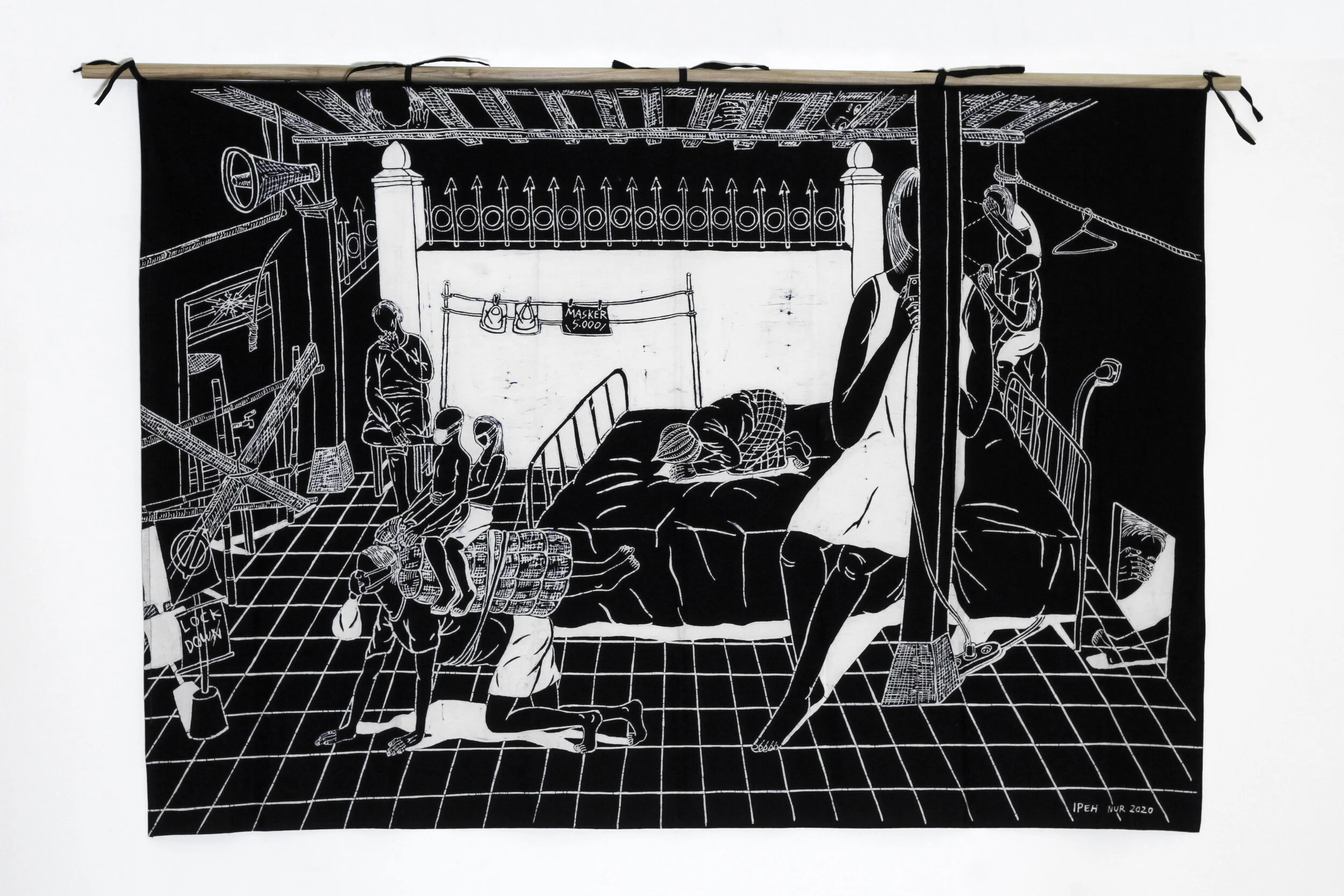Ipehnur Beresyit
Ipehnur Beresyit
The Chronicle of Twenty Twenty: Pagar, 2020
hand drawn batik, 110 x 150 cm
Ipehnur Beresyit
Artist Bio
Ipeh Nur was born in 1993 in Yogyakarta, Indonesia. She graduated from the Indonesian Art Institute in Yogyakarta specifically from the department of Printmaking. Her work departs from personal experience, problems of daily life, memory and history as background events. She is very interested in dramatic visuals, creating interactions within the works with different plots as if her figures and characters are on stage.
In this situation, I seem to be making my own scaffold, a temporary support, to keep my sanity physically, mentally and financially. This work is a landscape depiction of the conditions around me and what I feel. Specifically in the way people deal with the pandemic situation, haste, stutter. It is difficult to digest uncertain and varied information from the news. The work presents another point of view in society, such as using myth/culture and religious approaches to respond to this pandemic condition. On the other hand, I see the current situation as if it is pulling us back to the root of how the world used to be. Similarly in Javanese houses back then, there were barrels for guests and people in front of the entrance to simply clean themselves before entering the house. It was an old custom that was brought into practice today. Another old custom that we also reapplied is to drink herbal concoctions, or what we now consume, vitamins, to increase our body’s immunity. Therefore, the work will be a form of my personal response that tackles limitations and boundaries that we have in this situation.
Pagar (Fence)
I remember the chat at the food stall last March. In light of the outbreak, Jogja’s local government issued a PSBB (Large-Scale Social Restriction) regulation and several villages carried out lock down independently. In the chat, the man talked about the lack of work resulting in no input in terms of financial income. He seemed sceptical about the existence of Covid, he said that citizens of Jogja will not be affected by Covid because Jogja is already ‘protected’ by the ancestors and their heirloom. Another man was furious with the government because of the ban to worship in mosques. He believed that death is the destiny that God has for each and everyone of us and under- estimated Covid 19. Although there’s nothing anyone can do with the situation, society ought to be adaptive to all forms of change and that’s where people began to build a ‘fence’/ fort on what they believed in.
Yen ono pagebluk (If there is a disease outbreak)
Pagebluk or plague is not a new phenomenon in Java. There are several historical records regarding pagebluk in Java. Javanese people used to remember disasters through myths. The belief that there are signs before the outbreak of disease such as the emergence of cubebs or falling meteors. The efforts made to expel this pagebluk is by doing a ritual of repelling reinforcements. In this work, I quote from Primbon’s book on prayer to refuse reinforcements in order to avoid plague and things to do.
Perancah #1 (Scaffold #1)
This work departs from a drawing I made at the beginning of the independent quarantine period. I saw people, including myself, trying to maintain their sanity physically, mentally and financially. Fake news that was going around has led to many uncertain things including psychological and domestic violence cases. This resulted in fear and anxiety for the future.
Perancah #2 (Scaffold #2)
In these conditions, we often create boundaries and limit each other. The social distancing rule is one example where one began to create a gap to the extent of avoiding interaction as well as communications. However, this scaffold is a representation of people who begin to build support for the people around them. Some include transmitting positive energy, verbal and mutual support and creating bonds despite the situation.
Padasan (Hand washing bowl/Sink)
These days, people are experiencing ‘new normal’, a new pattern in life which ‘forces’ us to adjust with the standard health protocols. Some advice includes the 3M procedure that is to Wear a Mask, Keep our Distance, and Wash your Hands. Covid 19 has subtly encouraged people to return to displaying old instruments, in the form of padasans (hand washing places) in various forms. In the past, padasans were very common in Javanese homes. A padasan was a place that contained water to clean the body before entering the house. People used to believe in water as a refusal for sawan/bala (disease) to purify our body and soul.
Subur kang sarwa tinandur (Fertile)
I interpret this pandemic as a simulation of the future. With all things uncertain, the impossible becomes possible. Planting into a form of survival skill in addition to being entertainment or relieving stress (healing). Planting became another of my activities recently during the pandemic. I found the term pawukon (Javanese calendar) which helps me to calculate a good date to plant the plants. What this means is that there are always good days that are believed by the Javanese to apply to everything, even plants, which is certainly also for something complicated like the pandemic we’re fighting.
SELECTED WORKS







